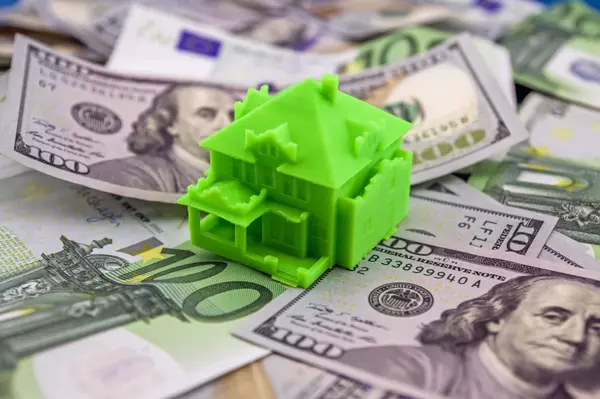Inflation is a tax... a hidden tax. Why would I say something equivalent to "I love taxes?"
Because as an owner of real estate, I'm the one collecting the taxes!
Before we move on, let's define inflation. Inflation is the increase in the cost of goods and services over time. Generally, in the US, we use the Consumer Price Index (CPI) to calculate how much prices are increasing for widely consumed goods and services. There's a lot of debate out there about whether it's a broken metric and what metrics might better assess inflation, but it's a commonly used metric and easy for most people to understand. For instance, when the cost of eggs goes up, all else equal, so does the CPI.
Real estate tends to outpace the CPI, but even if it didn't, real estate would still be an incredible asset class to hold during times of inflation (i.e. all the time). If real estate values grow at a rate of 4.5%/year, which is what's been happening, on average, in Colorado Springs over the last few decades, then my investment grows by 4.5%, right? Wrong. There are 4 components of real estate return that contribute to a real estate investment's return, and that 4.5% would only contribute to one of those ways.
The 4 ways real estate generates a return are 1) cashflow, 2) appreciation, 3) debt pay-down, and 4) tax savings. Assuming a neutrally cashflowing rental, which is what year 1 of my investment strategy looks like in Colorado Springs, I rely on the other 3 return drivers to provide an ROI (return on investment). The 4.5% applies to category 2 - the appreciation. Category 3 provides a sizeable amount of my return as well as the tenant is essentially paying off my mortgage. And category 4 is the silent return driver, as real estate is one of the most tax-advantaged asset classes in America. Not only does depreciation and expenses from owning rentals wipe out the taxes from the rental income, it also wipes out the taxes from my wife's active duty military income with my status as a real estate professional.
Adding up these 4 components of return, I'd likely end up with a 7-10% total return, which is about the same as the stock market, so why would I be so crazy about real estate? It's less liquid, takes a lot of effort to purchase, and demands attention and variable cash infusions to keep running. I love real estate mostly for another reason - it's ability to collateralize the cheapest debt available in our economy.
When I buy real estate, I always employ some sort of financing technique. Not only does this make the real estate obtainable as I don't have a significant amount of capital, but it also amplifies my returns. By applying a high-leverage approach to my investment, I'm able to shrink the denominator of the return calculation, doubling, tripling, and sometimes quadrupling the return of the unlevered asset. And real estate debt, unlike lending against stocks, doesn't have margin calls. As long as I keep paying the mortgage, I'm free to continue holding the asset un-interrupted. Warren Buffett famously said his favorite holding period is "forever." Real estate leverage allows you to amplify returns and hold forever without the same downside risks of employing leverage against equities like stocks.
What does this all have to do with inflation?
When I use leverage to buy real estate, I take out (or take over...) a 30-year loan at a fixed rate of payment. At the beginning, I may be cashflow neutral, but as inflation pushes rents up and my largest expense - the mortgage - stays fixed, my cashflow grows. Additionally, the inflation affects the value of the home, growing my equity position at an exponential rate. The faster inflation affects rents and home values, the faster my wealth grows. I don't even care which grows more - rents or home values - because both help me out.
The market typically swings between being "affordable" for renters affordable for buyers. Right now, affordability is pretty tough for buyers - but to me, that means the next few years will likely see rents grow quicker as more people feel it's "cheaper" to rent and demand for rentals surges. That'll help my portfolio's cashflow. If the pendulum swings back toward greater demand for homes to purchase, that'll help my equity. It's a win-win.
At the beginning of this post, I mentioned that inflation is a tax. It's a tax on those who don't own assets. To someone who is renting, the cost of their rent goes up. To someone who has to buy groceries (everyone), their expenses go up. If wages don't increase at the same pace, they're falling further and further behind in purchasing power. To someone who owns assets that grow with inflation, like real estate, they just get richer. And if they've employed leverage, they're growing richer very quickly, certainly quicker than their grocery bill is increasing.
I'm not saying this is a fair system - it disproportionally hurts those who aren't in a position to buy a home or assets. Most people, however, are in the camp of being able to afford to buy something, but they choose not to. These are the people to whom I am speaking. Don't let inflation tax you - let it pay you.
And for those who can't buy now, it would be wise to work toward a situation where you can buy later. Budgeting, saving, and investing are vital skills to a healthy long-term financial picture, and I would argue that asset ownership is the key to that next level of wealth.
Don't hate the player, hate the game. I've figured out how to play, and I'm trying to bring as many people as I can along with me. Let's get rich together.













